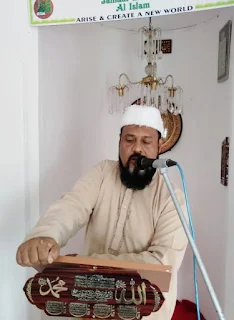Surah Al-Hujurat: On 'Ghibbat'
Alhamdulillah,
I continue on the same subject of my Friday Sermon on
“Ghibbat” (backbiting)
and the subjects connected with it, especially Muhabbat
(love) for Allah, for the Holy Prophet
(pbuh) and for the works of Deen-i-Islam
(Way of Islam). And this is the 5th
Friday [5th
part on Surah Al-Hujurat - Ghibbat]
, and I am going into details to make you all understand profoundly
this subject.
Like
I told you last Friday, Hazrat Muhammad (pbuh) had a direct connexion
with Allah and this love came directly from Allah (swt). He did not
have to struggle (wage Jihad)
for it. But for common people, it becomes necessary that they
struggle – make efforts – to acquire divine love as it is not an
easy task to obtain Allah’s direct love as well as the love of the
prophet (pbuh). And it is not also simple to establish, in connexion
with this love, relations of love with people in general.
There
should be efforts made to attain this goal and for this you you need
to focus on [your] Muhabbat
(love) and all defects therein and you need to make the necessary
efforts to get rid of those weaknesses. To be able to do this, you
need to have the feel and interest for it, and without this feel and
interest, then there can be no love for Allah, and for the Messenger
of Allah. If the feel itself is low, weak, then your love for the
person whom you love also shall be little. This is a natural
occurrence and many times, by neglecting this aspect/ subject, you
stop looking for solutions for your internal, intrinsic problems. You
think that despite making so much efforts to acquire the love of
Allah, despite praying so hard (making duahs),
you aren’t getting any taste/ feel and pleasure in your Salaat/
Namaz (i.e. the obligatory prayers) and
in the performance of good deeds. You think that you are doing duahs,
and yet your duahs
are not being accepted.
A
possible reason for this is that the feel itself [your feel for
prayer etc.] has been ruined, and that is why all the time your mind wander
and is attached to mundane pleasures which you deem correct. You feel
attracted
to all this; your
love for mundane things has surpassed the love which you needed to
have for Allah and thus this has not created the feel in you for
attaining Allah’s love or to do good deeds.
When
the feel is not right, then the love also shall not be right. It
would only remain in the realm of imagination. It would remain only a
claim only [words which are not translated into actions]. When your
love for Allah does not come out from the profoundness of the heart,
then your duahs
also will not come out from the profoundness of your heart, and your
Salaat
also shall not have any feel, and you will hurry to finish your
prayers in few seconds or minutes as if they were a burden for you.
So,
to be able to succeed in acquiring that feeling in your prayers
(Namaz) –
deep love for prayers, to acquire that connexion with Allah – and
to have your supplications (duahs)
accepted, you need to bring about a great spiritual reform in you.






















